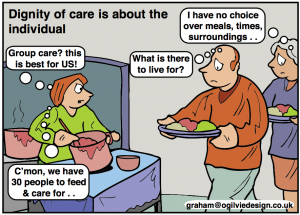When working in a care home, it is all too easy to forget that it is somebody’s home. You leave at the end of your shift, but residents stay because this is where they live. They have the right to the same courtesy, politeness and respect that you would expect in your home; everyone has this right, regardless of background or mental capacity. Residents are individuals not objects, and it is imperative to demonstrate respect in every aspect of your relationship with them.
High quality services should strive to demonstrate Dignity in Care by ensuring that they:
- Have a zero tolerance policy of all forms of abuse
- Support people with the same respect they would want for themselves or a member of their family
- Treat each person as an individual by offering a personalised service
- Enable people to maintain the maximum possible level of independence, choice and control
- Listen and support people to express their needs and wants
- Respect people’s right to privacy
- Ensure people feel able to complain without fear of retribution
- Engage with family members and carers as care partners
- Assist people to maintain confidence and positive self-esteem
- Act to alleviate people’s loneliness and isolation
During inspections, many care homes struggle to provide evidence that they are truly providing dignity and respect to all their residents. All too frequently, they sign up to schemes such as Dignity in Care but forget it is more than just putting up a few posters. Actual care and respect has to be continually demonstrated in daily life; it is not a PR exercise.
Care home operators should bear in mind the need to provide evidence of Dignity in Care. It is essential to provide adequate training for all staff using the Skills for Care website, or talking to organisations like Prorisk Care for a bespoke training service. Taking a proactive stance from the moment you sign up to Dignity in Care shows that you are serious about the issues involved. The Human Rights Insight Project revealed that vulnerable groups considered being treated with dignity and respect as the single most relevant factor when dealing with workers in the NHS or social services.
“The campaign’s core values are about having dignity in our hearts minds and actions, changing the culture of care services and placing a greater emphasis on improving the quality of care and the experience of citizens using services including NHS hospitals, community services, care homes and home support services.” – Dignity in Care
It is important to find out exactly what residents want. Do not assume that they want to sit in front of a television for most of the day. Care home residents are human beings with ideas and aspirations of their own, which need to be respected. Take time to find out what people actually want to do and what interests them. Do they want to play board games? Go for a walk? Become involved in the local community? Visit friends and relatives? Read books that they want, rather than what you think they ought to read? I was at one home where a resident was a former RAF pilot and had written many books on flying. We arranged to take him to the airport, and he went up in a plane. This demonstrated respect for his interests and his personal happiness.
Focusing on respecting residents, and providing Dignity in Care is a great opportunity to involve local communities, schools, friends and relatives of residents. Poet John Donne pointed out that ‘no man is an island, entire of itself’: every resident and every care home is part of a wider community and residents have the right to be involved.
Showing respect takes many forms: enabling people to maintain their usual standards of personal hygiene; providing a choice of nutritious, appetising meals, that meet the needs and choices of individuals, and support them with eating where needed; ensuring that people living with pain have the right help and medication to reduce suffering and improve their quality of life.
Above all, remember that your workplace is the residents’ home. Withdrawal of respect inhibits choice and control, therefore care homes should strive to enable people to make choices about the way they live and the care they receive. You should never assume that people are not able to make decisions: involve people in their own care plans and always consider alternative ways that the residents could communicate with you.


